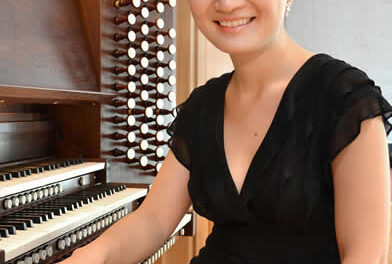For their winter concert, SONAM (Singers of New and Ancient Music), under the exceptional direction of Allan Friedman offered a concert featuring music about light and gifts, most of it written by contemporary female composers, and the first seven movements of Sergei Rachmaninoff’s shimmering All Night Vigil. All proceeds will benefit East Durham Children’s Initiative, a nonprofit organization that helps children in Durham from cradle to college and career.
After a brief introduction to the East Durham Children’s Initiative, the concert opened with the Rachmaninoff. Friedman laid claim to a twenty-one-year dream to conduct the Rachmaninoff All Night Vigil, also sometimes referred to as The Vespers, and as he launched into the first awesome hymn, “Come, Let Us Worship,” it became quickly apparent that he had indeed lived with this music for a considerable time. There was no doubt about the dedication of the individual singers who make up SONAM. And any choir is significantly enhanced by an accompanist like Jane Lynch.
There are so many elements and techniques indicated in this music: Rachmaninoff’s gift for soaring melodies, that support one other by crossing dynamics in opposite directions and then blending as one. The rich harmony is spread across the full vocal range of each part. And then, Rachmaninoff calls for bass singers who can reach an audible low B-flat who may be as rare as asparagus in January. There are nuances that appear simple on the page but are substantially difficult in performance. It takes an extremely skilled and perceptive conductor to bring this music to life in all its ethereal glory and mystical power. Among the musically knowledgeable acquaintances I chatted with, all agreed that Friedman earned his Vesper Wings today with flying colors.
Sung in Church Slavonic and without accompaniment, each hymn was given a unique treatment. The second hymn “Bless the Lord, O my soul” called all to the glory of God with alternating vocal blends. Hymn no. 3 recalled the blessings of the righteous man with repeated overwhelming Alleluias. The gorgeous hymn, “Gladsome light,” began as a tenor solo sung on this day by tenors in unison, then adding choral voices as it developed.
The favorite, Hymn no. 6, “Rejoice, O Virgin” (“Bogoroditse devo,” in Russian and often translated “Ave Maria”) started in a simple four-part harmony. The second verse continued with the divided altos singing a gentle rocking lullaby while the tenors and sopranos sang the most exquisite soaring melody which raised from pianissimo (pp) to fortissimo (ff), in just four measures, adding the basses. The full chorus then diminished back to pp in four measures and ended with a major chord sung ppp.
In his later years, living in the USA, Rachmaninoff often expressed homesickness, not just for the countryside of Russia, but for the basic diatonic harmonies and straight-forward rhythms of the past. He expressed no interest in the so-called modernism or experimental music that many of his colleagues were pursuing, so he left us this enriched conservative romanticism. Every now and then there comes along an ensemble of gifted musicians who hold nothing back, and when we experience such a performance as we heard today, we know it because it is something truly special.
Next on the program was “The Word Was God” by the highly acclaimed and sought-after woman composer, Rosephanye Powell. The anthem was a lively, vigorous setting of text from the first chapter of the Gospel of John in a fast, slow, fast framework, sung convincingly by SONAM.
“Custodes Angeli” (Guardian Angels) from The Nine Orders of the Angels by Patricia Van Ness was an ethereal musical portrait of the guardian angel who watches over and cares for us.
Kala Pierson‘s “Broadloom” is a wordless, random, but partly structured piece for mixed chorus. A group of pitches were assigned randomly to groups divided out of the chorus with instructions about when and how to sing their assigned passage or passages. At least that is how I understand it. It came out pleasantly. Some liked it. Some not so much.
Abbie Betinis is a composer whose music has been called “superb… whirling, soaring”, and “audacious… edgy… thrilling” (Minneapolis Star Tribune). A McKnight Artist Fellow, her music unfolds with a dramatic, melodic impulse, often inspired by language, patterns, and play. Her “Dormi Jesu” (Sleep, Jesus) is a lovely, gentle lullaby – rich in harmony.
“Butterfly” by Mia Makaroff, a charming love song in cool jazz style closed the program on a swinging and happy note. Nothing more needs to be said. This was certainly among the finest choral concerts in the Triangle’s 2019-2020 season.











